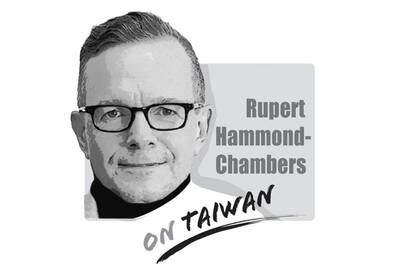On the day after Taiwan's Dec. 3 local government elections, the people of Hong Kong once again held a large-scale demonstration, demanding democracy and direct elections, rather than having their chief executive appointed by Beijing. On July 1 last year and the year before, half a million Hong Kongers took to the streets for the same reason. What a contrast to the cheerful scenes when the territory was returned to Chinese rule in 1997.
What caused the change? The main reason is that conditions in Hong Kong have slowly deteriorated since the handover. There are less freedoms, the economy has weakened and public order has worsened. Hong Kongers' quality of life and dignity have declined, because the territory is now under Beijing's thumb. Because of the economic downturn, its position in the world has steadily declined, along with foreign views of the territory.
When people talk about Hong Kong today, what they picture is no longer a free, prosperous and vigorous world-class cosmopolitan society. Instead, it is a part of the communist world with an ailing economy, collapsed public order, and limited freedom.
In the near future, I am afraid that when people talk about Hong Kong, they will talk about it as if it were Shanghai or Shenzhen, and the free and prosperous "oriental pearl" will only be a memory.
China experts in the West have said that Hong Kong is like a frog in a pot of water. It would struggle if put immediately into a pot of boiling water, but it will be cooked to death without realizing it if the water is heated up gradually. This is exactly the territory's situation today, and those who are unwilling to be cooked to death staged the recent protest to voice that sentiment.
Hong Kong's situation serves as a warning to Taiwan. After the Democratic Progressive Party's (DPP) thrashing in the local government elections, calls for President Chen Shui-bian (陳水扁) to loosen his China policy in order to promote cross-strait reconciliation can be heard from both the DPP and the Chinese Nationalist Party (KMT).
But if Taiwan tilts toward Beijing, the nation will gradually become a second Hong Kong. As Beijing calls on Taipei to open cross-strait links, its purpose is to hollow out Taiwan, while forcing it to accept the policy of "one country, two systems" through economic means.
Since Taiwanese people have not experienced communist rule before, they often underestimate the evilness of the Chinese Communist Party (CCP). The KMT is clear about the CCP's nature after having dealings with it for over 80 years. Unfortunately, some of the KMT members have united with the CCP in order to attack Taiwan. They uphold nationalism and claim that people on both sides of the strait are Chinese, so as to bypass the fundamental confrontation between democracy and authoritarianism on the two sides. They also use cross-strait economic development as bait to deceive the pure and simple Taiwanese people.
If Chen, under pressure, really leans towards the middle way and opens his China policy as KMT Chairman Ma Ying-jeou (馬英九) suggests, Taiwan will become like the frog in the water. It may be unable to feel any pain at first, but it will slowly become supper on the dinner table of China's dictators' as Beijing resorts to every conceivable means in its ongoing "united front" effort. By that time, it will be too late for Taiwanese people to learn from Hong Kongers, and too late to take to the streets to cry for help.
Cao Changqing is a writer based in New York.
Translated by Eddy Chang
Having lived through former British prime minister Boris Johnson’s tumultuous and scandal-ridden administration, the last place I had expected to come face-to-face with “Mr Brexit” was in a hotel ballroom in Taipei. Should I have been so surprised? Over the past few years, Taiwan has unfortunately become the destination of choice for washed-up Western politicians to turn up long after their political careers have ended, making grandiose speeches in exchange for extraordinarily large paychecks far exceeding the annual salary of all but the wealthiest of Taiwan’s business tycoons. Taiwan’s pursuit of bygone politicians with little to no influence in their home

In 2025, it is easy to believe that Taiwan has always played a central role in various assessments of global national interests. But that is a mistaken belief. Taiwan’s position in the world and the international support it presently enjoys are relatively new and remain highly vulnerable to challenges from China. In the early 2000s, the George W. Bush Administration had plans to elevate bilateral relations and to boost Taiwan’s defense. It designated Taiwan as a non-NATO ally, and in 2001 made available to Taiwan a significant package of arms to enhance the island’s defenses including the submarines it long sought.
US lobbyist Christian Whiton has published an update to his article, “How Taiwan Lost Trump,” discussed on the editorial page on Sunday. His new article, titled “What Taiwan Should Do” refers to the three articles published in the Taipei Times, saying that none had offered a solution to the problems he identified. That is fair. The articles pushed back on points Whiton made that were felt partisan, misdirected or uninformed; in this response, he offers solutions of his own. While many are on point and he would find no disagreement here, the nuances of the political and historical complexities in
Taiwan faces an image challenge even among its allies, as it must constantly counter falsehoods and misrepresentations spread by its more powerful neighbor, the People’s Republic of China (PRC). While Taiwan refrains from disparaging its troublesome neighbor to other countries, the PRC is working not only to forge a narrative about itself, its intentions and value to the international community, but is also spreading lies about Taiwan. Governments, parliamentary groups and civil societies worldwide are caught in this narrative tug-of-war, each responding in their own way. National governments have the power to push back against what they know to be